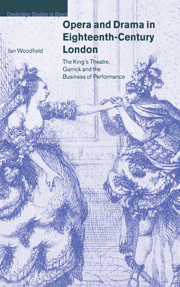 Opera and Drama in Eighteenth-Century London
Opera and Drama in Eighteenth-Century London Draft petition to the Lord Chamberlain from Sheridan and Harris (1777)
Published online by Cambridge University Press: 22 September 2009
Gentlemen
According to your desire the Plan of the proposed Assistant Theatre is here explained in Writing for your further consideration.
From our situations in the Theatres Royal of Drury Lane and Covent Garden, we have had opportunities of observing many circumstances relative to our general Property which must have escaped those who do not materially interfere in the management of that Property – One point in particular has lately weigh'd extremely in our Opinions which is an Apprehension of a new Theatre being erected for some species or other of Dramatic Entertainment. Were this Event to take place on an opposing Interest in all probability the contest that would ensue would speedily end in the absolute ruin of one of the present Established Theatres, – We have reason it is true from His Majesty's gracious Patronage to the Present Houses to hope that another Patent for an opposing Theatre is not likely to be obtained – but the motives which appear to call for one, are so many and those of such nature as to encrease every day – that we cannot on the maturest consideration of the subject divest ourselves of the dread of such an event. With this Apprehension before us – We have naturally fallen into a joint consideration of the means either of preventing so fatal a Blow to the present Theatres or of deriving a general advantage from a Circumstance which might otherwise be their ruin –
Some of the leading motives for the establishment of a third Theatre are as follows –
1st: The great extent of the Town and encreased Residence of a higher class of People who on account of many inconveniences seldom frequent the Theatres –
[…]
To save this book to your Kindle, first ensure [email protected] is added to your Approved Personal Document E-mail List under your Personal Document Settings on the Manage Your Content and Devices page of your Amazon account. Then enter the ‘name’ part of your Kindle email address below. Find out more about saving to your Kindle.
Note you can select to save to either the @free.kindle.com or @kindle.com variations. ‘@free.kindle.com’ emails are free but can only be saved to your device when it is connected to wi-fi. ‘@kindle.com’ emails can be delivered even when you are not connected to wi-fi, but note that service fees apply.
Find out more about the Kindle Personal Document Service.
To save content items to your account, please confirm that you agree to abide by our usage policies. If this is the first time you use this feature, you will be asked to authorise Cambridge Core to connect with your account. Find out more about saving content to Dropbox.
To save content items to your account, please confirm that you agree to abide by our usage policies. If this is the first time you use this feature, you will be asked to authorise Cambridge Core to connect with your account. Find out more about saving content to Google Drive.